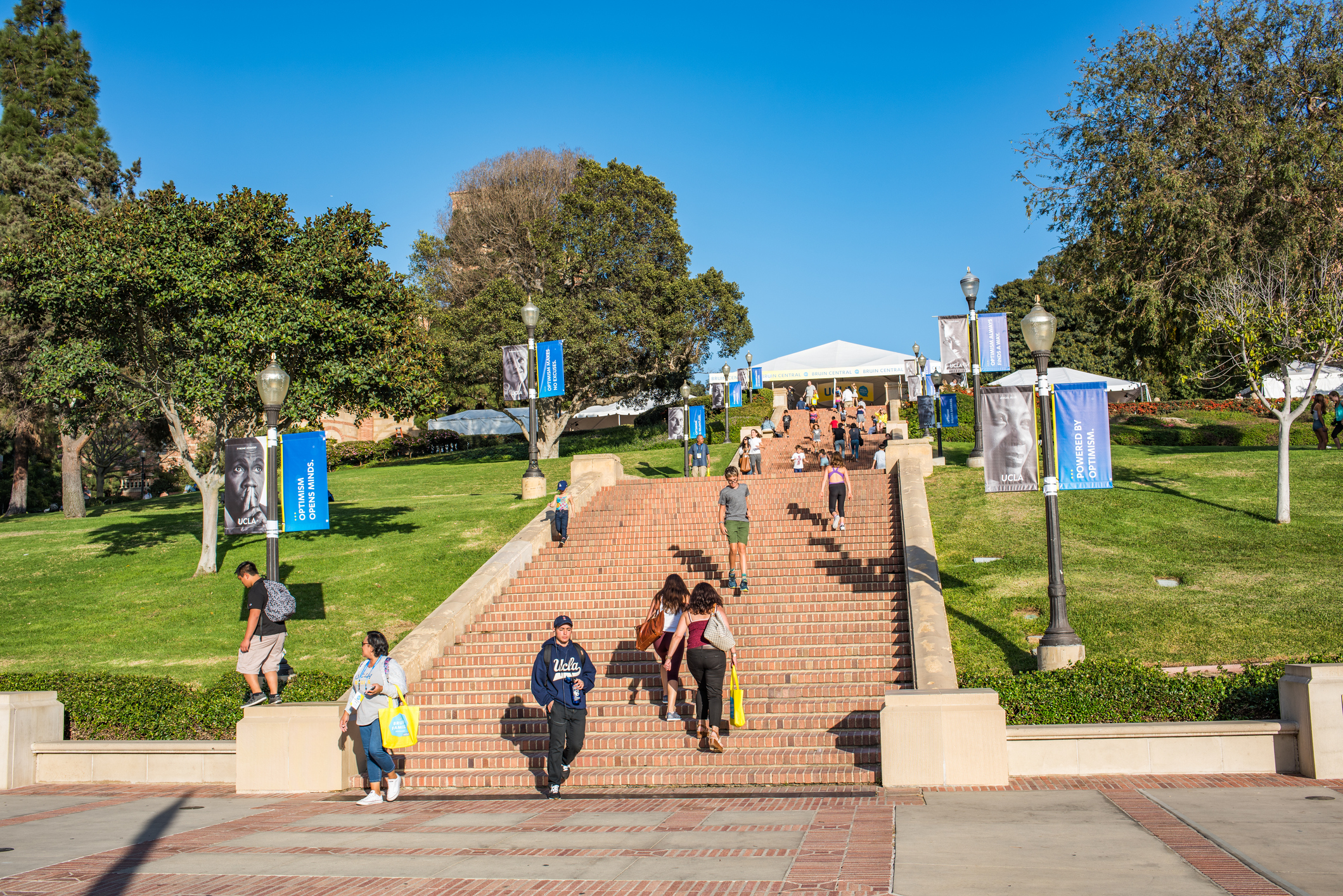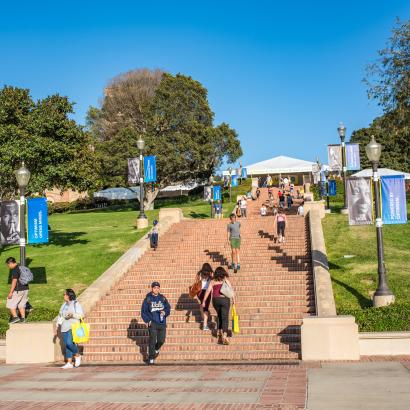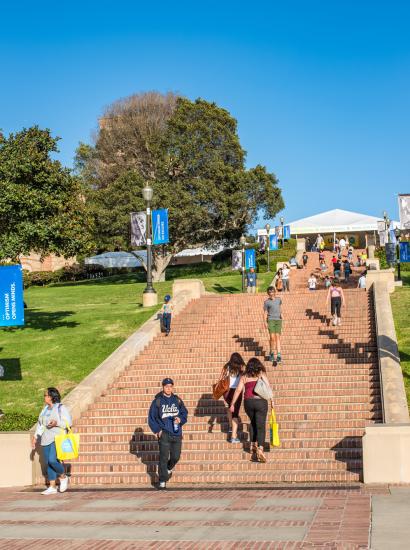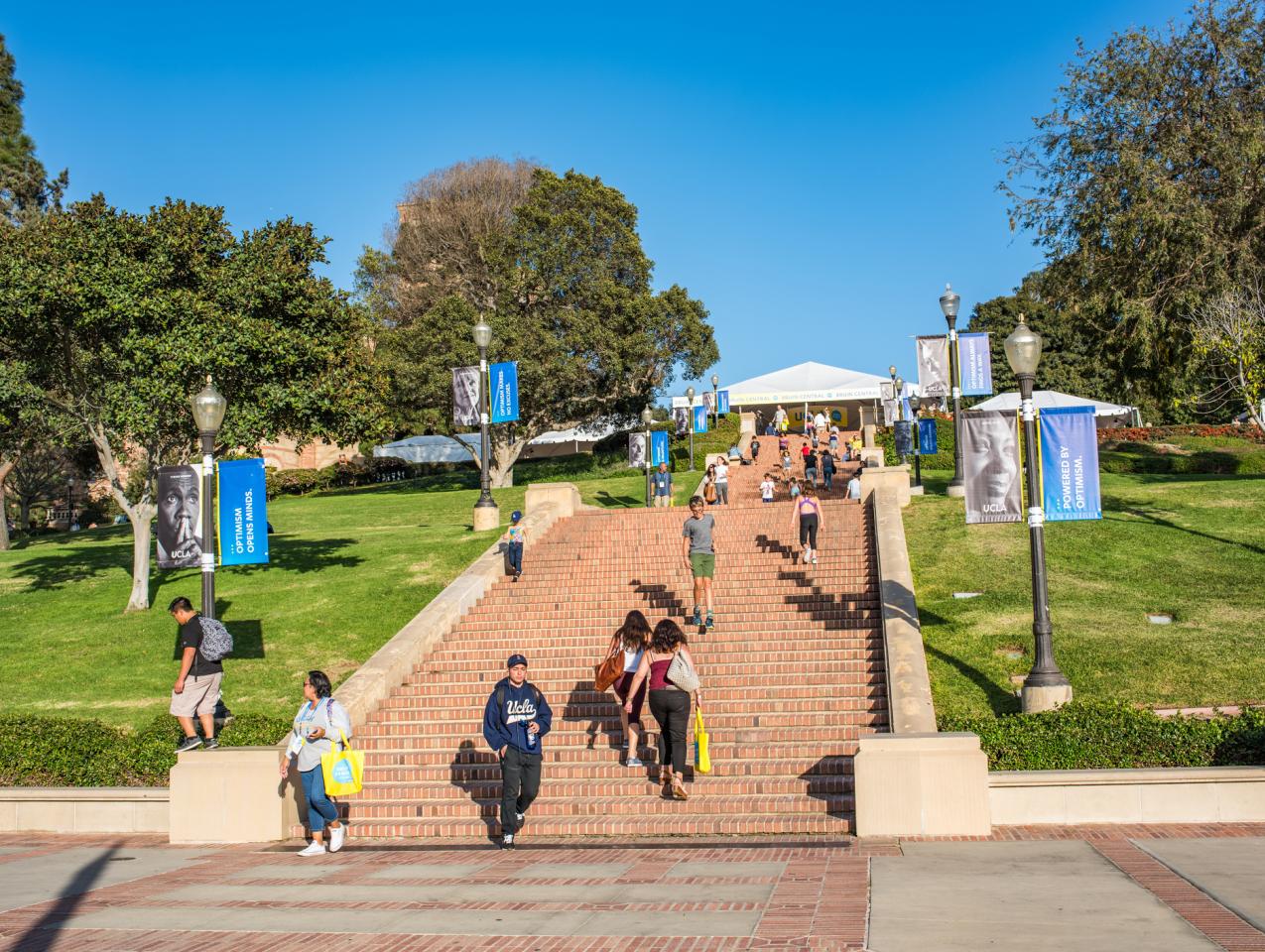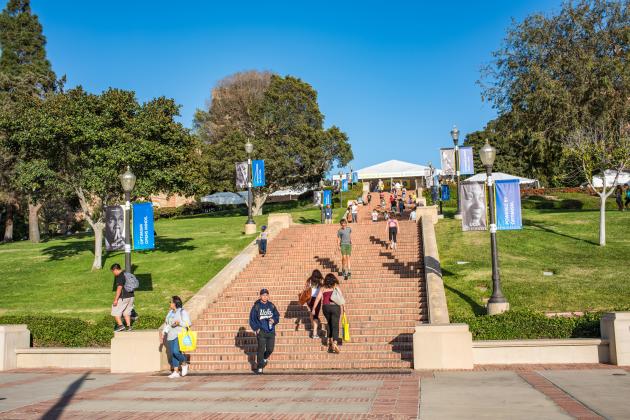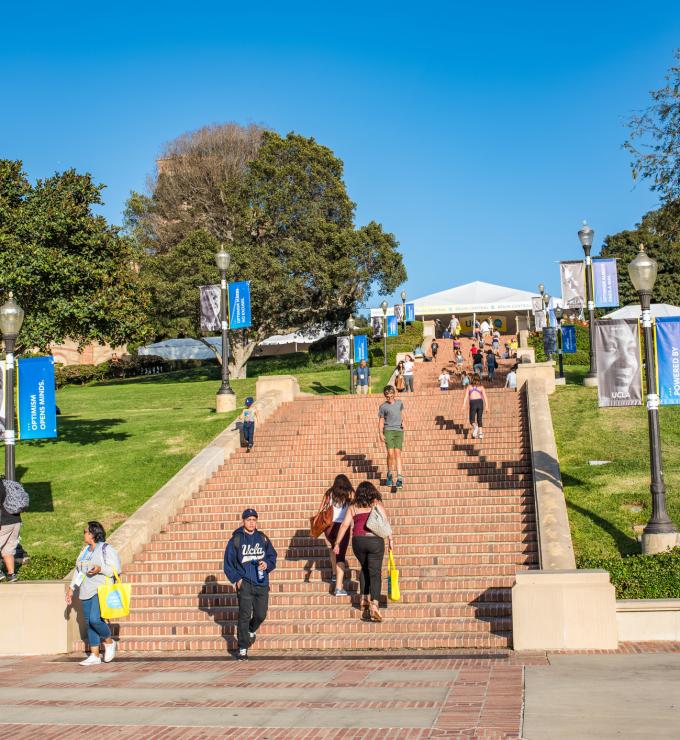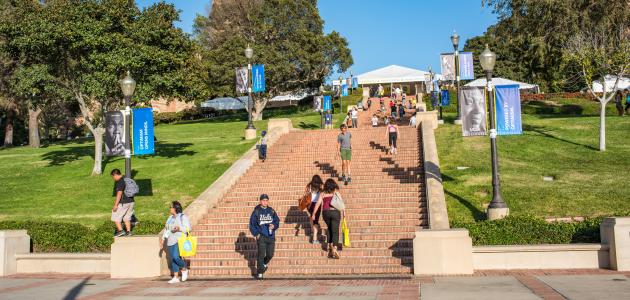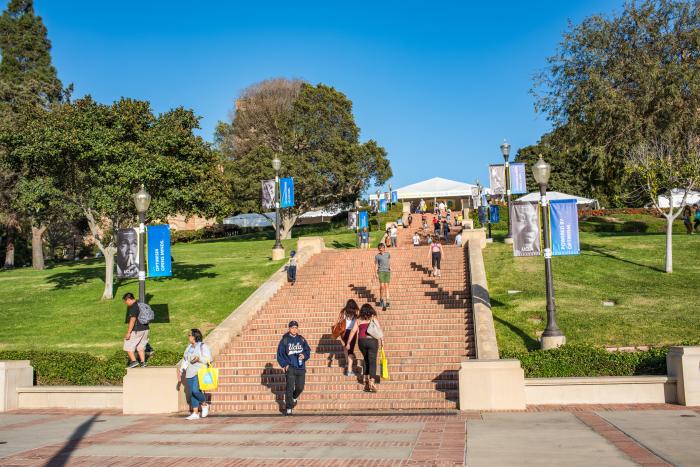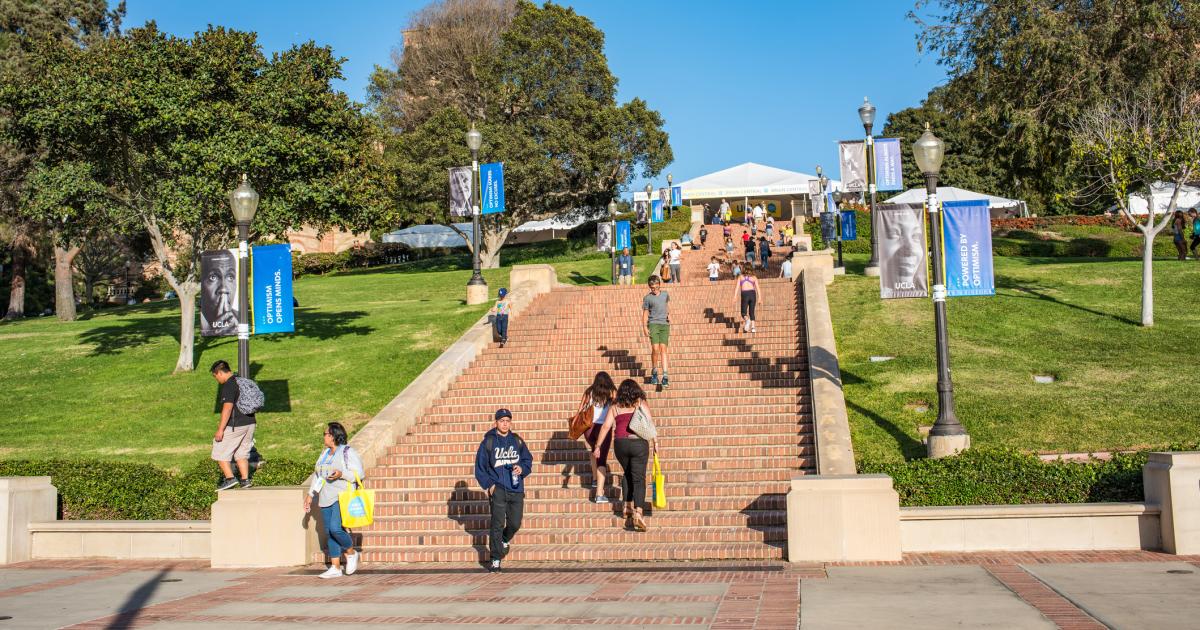In addition to serving as a senior fellow at the Hoover Institution, I have been a professor for 25 years in UCLA’s Economics Department, where I have taught more than 7,000 undergraduate students and 500 graduate students. And as I walked past the pro-Palestinian student encampment early last week at UCLA, I couldn’t imagine any UCLA students whom I have interacted with over these past 25 years taking over university property, preventing fellow students from walking across campus, disrupting the normal functioning of the university, or having so much hatred as to spray-paint “F*** Jews” on the makeshift barricades that framed the perimeter of the camp. Or to think that that they could dictate University of California policy regarding how the UC makes investments or restricting the commercial organizations that the UC does business with.
And I can’t imagine any of the students I have known to vandalize Royce Hall, UCLA’s most iconic building, after the encampment was forcibly disbanded last week, or to trash the campus’s central quadrangle with refuse ranging from broken tents and pizza boxes to human feces. These acts are not just criminal—they are selfish, immature, and indecent.
There were roughly 500 protesters, perhaps a few more, at the encampment when it was forcibly disbanded by California Highway Patrol officers early Thursday morning of last week. About 300 left peacefully, and around 200 were taken into custody. To put this in perspective, UCLA is home to 46,000 students and 31,000 individuals who work on campus, including nearly 8,000 faculty. Five hundred protesters out of a population of 77,000 represents about 0.6 percent of the UCLA community, assuming that all who were there were part of UCLA. Some reports indicate that many protesters were from outside of UCLA, which would reduce that percentage even lower.
I had the opportunity to speak with one protester last week. He spoke against Zionism and the need for an immediate cease-fire in Gaza, and he equated Israel with White supremacism, racism, and colonialism. But his opinions were not particularly well-informed. I asked what Zionism meant and he didn’t have a clear answer, other than saying it represents what Israel is today. He didn’t know that two million Arabs live in Israel, representing 20 percent of the Israeli population, and enjoy the same rights as Israeli Jews. I asked him his opinion of how many lives may have been saved had Hamas immediately released its hostages after October 7 and surrendered in return for a commitment to a permanent peace with Israel. No answer. And regarding White supremacy, he didn’t know that Jews and Arabs share considerable common DNA, and that some of today’s Muslim Arabs have ancestors who were ancient Christians and Jews. The protester believed that Israel was almost exclusively populated by those of European heritage.
He didn’t know that the geographical area in dispute was settled by Jews nearly 2,000 years before the Islamic religion existed. He wasn’t aware that the United Nations’ two-state proposal of 1947 had been accepted by Jews but was declined by Arabs because Arab leaders were opposed to giving any land for a Jewish state. I asked whether being ruled by Hamas, which is dedicated to the destruction of Israel, was in the best interest of those living in Gaza. No response. None of this seemed to matter. The protester’s message was simple: Israel was the enemy, and the UC must stop investing and doing business with organizations that engage with Israel.
UCLA leaders are now shocked by the violence that occurred. I don’t understand how anyone could hold this view. What happened was entirely predictable and could have been prevented with rules that delineated what the university would and would not permit. But UCLA failed to do this.
Universities are collections of scholars and students who have the freedom to pursue knowledge, and this freedom can only be maintained by an organization that is politically neutral. Because universities are home to differing opinions, university leaders must ensure the safety of their community and the adherence of all to civil and respectful conduct. This wasn’t done at UCLA. Once UCLA leadership permitted the encampment, these principles were violated as campers took over the Royce Hall quadrangle, blocked access, and planned to occupy university property until their demands were met regarding UC’s divestment and boycotting businesses with ties to Israel. To my knowledge, the university intended to permit the encampment to remain indefinitely.
The protesters’ primary goal was never about free expression. They had a plan to occupy part of the campus until the administration caved. UCLA’s leadership didn’t have a plan, at least not an effective one. And this is why things went so badly over the last week.
The encampment began on April 25. On that day, I received an email from the university, who reported that the encampment had formed, stating, “We’re actively monitoring this situation to support a safe and peaceful campus environment that respects our community’s right to free expression while minimizing disruption to our teaching and learning mission.”
However, the next paragraph indicated that access to the undergraduate library and Royce Hall were restricted. I considered this a “significant disruption,” and I believe most people would. What constituted a “significant disruption” among the university’s leadership? Who knows. And with this lax and amorphous communication, trouble began.
On Sunday, April 28, a Jewish student was beaten unconscious by protesters. A YouTube video shows another UCLA Jewish student being blocked from walking across campus by protesters while campus security stands by, presumably told by university leadership not to intervene. Around the same time, a UCLA professor who is Jewish was tackled and knocked to the ground while walking across campus.
Even after these events occurred, I continued to receive emails from the university indicating that the encampment protest was “mostly peaceful” and that the university was continuing to monitor the situation, supporting a safe campus while respecting the community’s right to free expression. As the “mostly peaceful” protest grew, UCLA’s Economics Department chairperson emailed the economics faculty indicating that some of our undergraduate students felt unsafe on campus, and he requested that we switch our classes to an online videoconferencing format. Where was the university’s leadership?
Matters turned worse early Wednesday last week when counterprotesters arrived. Later that day, an email from the university abstained from language about how it was maintaining a peaceful environment while preserving the rights to free expression for the campers. Rather, faculty, students, and staff were advised not to come to the university, and faculty were requested to hold classes online. On early Thursday morning, the encampment was forcibly cleared by law enforcement.
An email from university leadership arrived shortly after the camp was cleared, indicating that “In the end, the encampment on Royce Quad was both unlawful and a breach of policy. It led to unsafe conditions on our campus, and it damaged our ability to carry out our mission. It needed to come to an end.”
Finally. Better late than never, though clearly this was a case of closing the barn door long after the horse bolted. Given the university’s acceptance of the encampment over the previous week, its statement that the camp was unlawful and led to unsafe conditions was a non sequitur and raises the obvious question of why it was permitted in the first place.
The email then stated, “Over the past several days, we communicated with and made a formal request to meet with demonstration leaders to discuss options for a peaceful and voluntary disbanding of the encampment. Unfortunately, that meeting did not lead to an agreement.” Of course it didn’t. But there would have been an agreement if the campers were advised that law enforcement would be clearing the encampment and taking protesters into custody if they did not immediately leave.
Yesterday, I received another email from the university leaders. This one expressed sorrow about the violence and indicated that they were “perplexed” about what occurred. They continued to describe what had happened up to the point of counterprotesters’ arrival as a “mostly peaceful demonstration.” “Perplexed” by what happened? “Mostly peaceful”?
Universities should vigorously protect free speech. But free expression was never the goal of the UCLA demonstrators. Like protests occurring at other campuses, this one was about forcing policy changes by taking over university property—and making life unpleasant for the 99.4 percent of the UCLA community who respect the principles of what the university stands for.
A simple set of rules was needed. Proposed demonstrations should be coordinated with the university, including starting and ending times and a specific location. Security would be present to protect the safety and rights of everyone and prevent disruptions to the normal functions and operations of the university.
If such rules had been in place, I expect UCLA would have avoided what happened last week. I wonder if a protest would even have emerged under these rules, because it was never about just carrying signs or expressing respectful opinions. And until US universities understand this, these events will continue.







